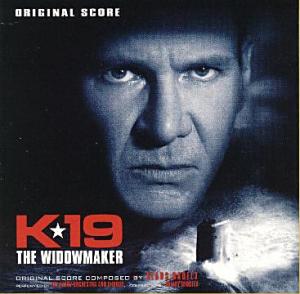Klaus BADELT
K19 The Widowmaker
with Julia Migenes (soprano)
Original score performed by the Kirov Orchestra and Chorus
HOLLYWOOD RECORDS 2061-62371-2 [68:59]

For this new film based on the true story of Russia's first nuclear submarine that suffered a malfunction on its maiden voyage in 1961, Badelt has written a dark hued melancholic score. Too much of it is in this mood of gloom -even the prestigious Kirov cannot relieve the tedium. There is also much that is derivative. The score is to all intents and purposes summarised in the four-movement 'Suite for Orchestra in G Minor' The opening movement (Fear-Largo) moves forward with the heavy tread of a funeral march and there is more than a hint of Tchaikovsky angst. War-Allegro shows Badelt's association with Hans Zimmer for there is more than a hint of that Gladiator battle music here. For the final 'Soul-Mysterioso' we are in Mahler territory, deep soul-searching and such floor-board quivering bass that the choir, pianissimo, is practically inaudible.
The succeeding tracks: 'Home', 'Heroes' and 'Journey' have little to differentiate them through a continuous bleak elegy (that is almost a dirge) with just a few upbeat (well as upbeat as you can possibly get in such a downbeat score) patriotic march rhythms. 'Capt. Alexi Vostrikov (Harrison Ford) seems stern and dourly stoical indeed from this musical portrait which nods this time towards Mussorgsky and is counterpointed by figures suggesting the submarine making heavy weather ploughing through the depths. For 'Missile Launch – The Rescue' the music stirs itself after a ponderous opening to the figures used in the 'War' movement of the opening Suite with the Dies Irae motif mingling with the Holst-like material.
The best thing on this album is the track rather enigmatically named 'Reactor – Selections from Voices of Light', composed by Richard Einhorn, a moving requiem scored for soprano (Julia Migenes, delivering beautifully phrased and controlled singing) and womens' voices preceded by tolling bells and followed by a most unusual but highly effective droning string dirge. The mood is carried forward into the final track 'Reunion' that is a rather lovely elegy with an affecting climax and some pleasing writing for woodwind.
A score best appreciated for its concluding two tracks.
Ian Lace

Gary S. Dalkin adds:-
K-19 The Widowmaker is Klaus Badelt's second major score and rapidly follows his music for the recent version of The Time Machine http://www.musicweb.uk.net/film/2002/Jun02/Time_Machine.html
(2002). The film stars Harrison Ford and Liam Neeson and purports to tell the true story of a little known piece of Cold War history involving the first nuclear submarine disaster. Strange then that the album for this tale of heroic Soviet submariners should open with a helping of cod Wagner at his most brooding and foreboding. Recalling the way Hans Zimmer's soundtrack for Crimson Tide (1995) was divided into five lengthy suites, this disc begins with a four part "Suite for Orchestra and Chorus in G minor". Presumably this is not a coincidence, as Badelt is a graduate of Zimmer's Media Ventures film scoring collective and has provided additional music for many of Zimmer's projects. Indeed, Zimmer gets a thank you in the notes, deservedly given the reworking of his "Mars" theme Gladiator (2000) now retitled "War - Allegro".
What follows is an hour's worth of superior suspense and action writing with a strong emotional core build around a theme bearing passing similarities to Zimmer's main melody from The Assassin / Point of No Return (1993). Cues such as "Soul - Misterioso" offer an understated longing with a dignity rare in modern blockbuster film making, while the waltz-like "Home" presents a sense of nostalgia akin to Maurice Jarre's Doctor Zhivago (1965). Clearly the temptation to introduce a balalaika proved just too much. With the beginning of "Heroes" Wagner returns and is determined not to go away, though the chord progressions soon acquire a more traditionally Russian melancholy. "Journey" revisits the nostalgia of "Home" then twice introduces a rousing choral version of the main theme in a cue which at over 13 minutes should form the heart of the disc but is unfortunately too fragmented to work as a stand alone piece of music. The portrait of "Capt. Alexi Vostrikov" commences with appropriately Russian brassy grandeur, then turns into a more propulsive version of the main theme, leading to the moment when the disc finally takes fire with "Missile Launch - The Rescue", once more reworking Gladiator's take on Holst…
So it is that the strongest cue on the disc is a montage entitled "Reactor - Selections from Voices of Light", and this is strange indeed because Voices of Light is a cantata by Richard Einhorn inspired by that composer's love of The Passion of Joan of Arc (1929), and later used as the soundtrack to a DVD version of that film. Here are eight minutes of extracts from that score as rearranged by Walter Murch. Fragments they may be, and rearranged fragments at that, but they leave a powerful impression. Indeed, enjoyable as parts of this current CD are most listeners will be more rewarded by the complete recording of Voices of Light, a simply superlative disc with spine tingling performances by early music ensemble Anonymous Four. Following this music is a hard act, but Badelt's final cue "Reunion", proves his most impressive simply for being so clearly indebted to Einhorn. A ghostly lament which is to all intents and purposes a continuation of the Voices of Light extracts before developing into an elegiac version of the "Home" theme. The performances are good though louder moments are seriously let down by some surprisingly harsh sound.
Gary S Dalkin

Return to Index